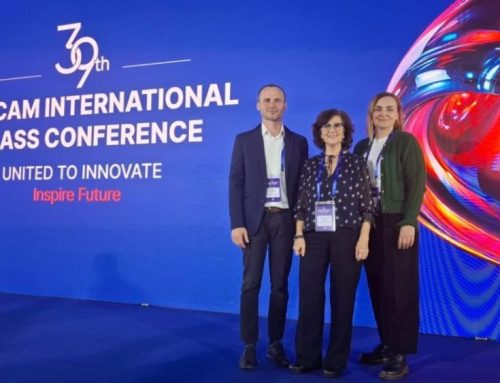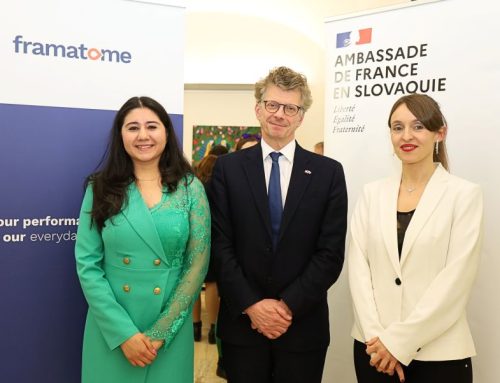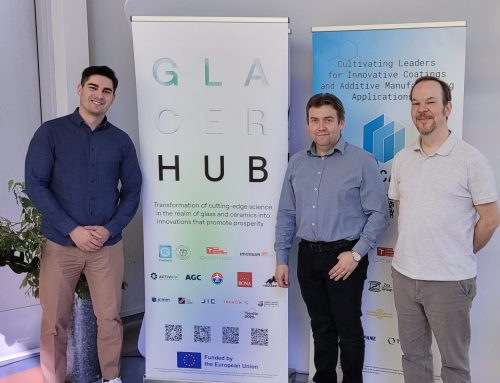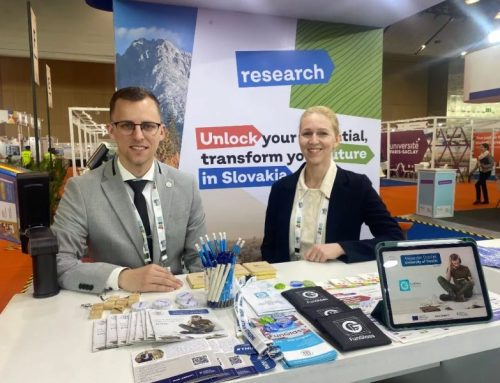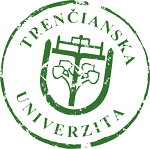Join the FunGlass through MSCA PF Action
The Centre for Functional and Surface Functionalised Glass (FunGlass, www.funglass.eu) is looking for ambitious researchers who want to push the boundaries of glass science through the prestigious MSCA Postdoctoral Fellowships programme. Join our dynamic, multicultural team of over 104 professionals, including researchers, technicians, PhD students and innovation specialists, and gain access to world-class research facilities and career development opportunities.
If you are considering applying, please note these key dates:
- Call identifier: Horizon-MSCA-2025-PF
- MSCA PF call @FunGlass closes: 31 May 2025
- MSCA PF call opens: 9 April 2025
- MSCA call closes: 10 September 2025 (for selected candidates)
APPLICATION INFORMATION:
Fellowships are open to researchers meeting the following criteria:
- PhD degree at the time of the deadline for applications (applicants who have successfully defended their doctoral thesis but who have not yet been formally awarded the doctoral degree will also be considered eligible to apply).
- Maximum of eight years of experience in research, from the date of the award of PhD degree, years of experience outside research and career breaks will not count towards the above maximum, nor will years of experience in research in third countries, for nationals or long-term residents of EU Member States or Horizon Europe Associated Countries who wish to reintegrate to Europe.
- The candidate must not have resided or carried out their main activity (work, studies, etc.) in Slovakia for more than 12 months in the 36 monthsimmediately before the call deadline on 10 September 2025.
Candidates are expected to apply for the research topic that corresponds to the scientific domains of the FunGlass Centre (described below) through which the candidate will demonstrate their excellence and potential to significantly improve the Centre’s research performance.
Researchers interested in applying for an MSCA Postdoctoral Fellowship at FunGlass should submit the following documents via email to Mrs. Marcela Brodová (marcela.brodova@tnuni.sk) by 31 May 2025. Please include the name of the department to which your project relates in the subject line of your email (example: MSCA PF – Dpt. of Coating processes).
- Cover Letter – Including a statement confirming the applicant meets the eligibility criteria.
- Curriculum Vitae (Max. 2 pages) – Accompanied by a list of the most relevant publications.
- Letter of Interest – Outlining the research proposal with an abstract and identifying synergies with a FunGlass scientific domain.
- Additional Supporting Documents – Any other relevant information that may support the evaluation process.
ABOUT FunGlass
FunGlass – Centre for Functional and Surface Functionalized Glass was established through the Horizon 2020 Teaming project (2017–2024) and has since grown into an internationally recognized, rapidly developing Centre of Excellence. Equipped with state-of-the-art infrastructure, it operates at Alexander Dubček University of Trenčín, Slovakia, in a region with a strong glass and ceramic industry presence.
The Centre boasts a talented international research team, state-of-the-art facilities, a globally connected and double degree doctoral program, modern management processes tailored to its needs, and a dedicated administrative department that actively supports researchers.
The Centre is dedicated to pioneering research in functional glass materials and the functionalization of conventional glass, unlocking new possibilities for innovative applications in society. At FunGlass, our team shares a common mission: to push the boundaries of knowledge in glass science. Recent research topics include:
- Key enabling technologies for photocatalysis, advancing energy-efficient and sustainable processes.
- Hydrogen-powered glass melting, promoting greener manufacturing solutions.
- Composite implants for biomedical applications.
- Antibacterial glass coatings, enhancing hygiene and healthcare solutions.
- Waste glass recovery and recycling, supporting circular economy initiatives.
- Corrosion-resistant coatings, improving durability in extreme environments.
During its tenure, the Centre managed to build strong relationships with respected academic partners (Prof. Boccaccini FAU, prof. Wondraczek FSU, prof. Bernardo UNIPD, prof. Duran CSIC, CEITEC Brno, IIS SAS, etc.) as well as industrial partners (AGC, Lithoz, Treibacher, RONA a. s., John Manville Slovakia, Stevanato Group, Vetropack a. s., etc.) which proves the relevance of our research on an international scale and its potential for industrial applications.
OFFER for grant holders
The FunGlass Centre offers for the successful MSCA PF grant holders with FunGlass as a hosting institution:
- Contract for 2 + 2 years (2 years funded from MSCA + 2 years extension). FunGlass offers its MSCA fellows an unparalleled opportunity to extend duration of their contract by two years (under the same terms as MSCA PF grant but funded from FunGlass institutional resources)
- State-of-the-art research infrastructure – including an investment of €9M in new laboratories inaugurated in 2022 (a full list of our equipment is available at https://www.funglass.eu/equipment/.
- Active collaboration with leading experts in glass science and technology in Europe Prof. A. R. Boccaccini, FAU Erlangen (DE), prof. L. Wondraczek FSU Jena (DE), prof. E. Bernardo UNIPD Padua (IT), prof. A. Durán CSIC Madrid (ESP).
- Access to secondments with world leading academic and industrial partners.
- Grant proposal services – support with preparation and implementation of your MSCA IF grant from a project management team with a track record of coordinating large multinational research projects (more than €45 million in secured funding through competitive grants since 2017).
- Eligibility to participate in MSCA widening grant scheme: SLOVAKIA belongs among the „widening coutries“ so researchers applying for a standard European Fellowship with a host organisation in a “widening country” can opt in to be considered for the ERA Fellowships call (directly in template). The best ERA Fellowships projects will be awarded to excellent applicants who were not selected under the MSCA Postdoctoral Fellowships call due to budget constraints. In addition, the applicants whose MSCA PF project proposals ranked above a predefined quality threshold (85%) but which was not funded by Horizon Europe due to budgetary constraints will be awarded by the Seal of Excellence label. This project will receive the certificate of the “Seal of Excellence” together with the evaluation results letter. These projects are judged to deserve funding and are recommended to receive support from other EU or national sources.
The FunGlass Centre comprises six RESEARCH DEPARTMENTS, each mentored by leading experts in glass science and technology from renowned partner institutions across Europe:
- Lead by Dr. Martin Michálek
- Active collaboration with prof. Aldo R. Boccaccini from Institute of Biomaterials at the Friedrich Alexander University Erlangen-Nuremberg, Germany.
- The Biomaterials Department is at the forefront of innovation, dedicated to advancing research on bioactive materials, particularly bioactive glass, bioceramics, and biopolymers. Our mission is to push the boundaries of biomaterials science by developing novel treatments and functionalization techniques that unlock new therapeutic possibilities. We focus on creating materials with enhanced capabilities, paving the way for groundbreaking applications in healthcare. A key emphasis is integrating advanced functionalities into bioactive materials, particularly for therapeutic applications such as targeted drug delivery and tissue engineering. These efforts align with emerging trends in personalized medicine, nanotechnology, and regenerative medicine. By leveraging cutting-edge technologies and fostering interdisciplinary collaboration, we aim to design materials that not only support tissue regeneration but also provide tailored therapeutic responses, revolutionizing healthcare outcomes.
•Department of COATING PROCESSES:
- Lead by assoc. prof. Amirhossein Pakseresht
- Active collaboration with Alicia Durán from the Institute of Ceramic and Glass, Spanish National Research Centre, Spain.
- The coating department focuses on developing advanced high-temperature coatings (TBCs/EBCs) by synthesizing novel sprayable powders combined with optimized air/suspension plasma spray parameters to achieve tailored coating structures and ensure rigorous durability evaluation. Design and synthesize new high-entropy powders for next-generation TBCs and develop polymer-derived ceramic (PDC) coatings for high-temperature oxidation resistance. Fabrication of anti-reflective and low-emissivity (ZnO/TiO₂/SiO₂, Ag, and Al) coatings, as well as wear-resistant coatings (TiN, Si₃N₄, and DLC) on glass substrates using a hybrid PECVD-PVD method. This approach aims to optimize optical and mechanical properties through precise material selection and process control in an industrial pilot setup. Development of anti-corrosive composite coatings for metallic structures, particularly for biomedical implants surfaces of biodegradable (Mg, AZ31B, WE43B), permanent (Ni-Ti alloys) implants and light alloys utilizing Sol-Gel, PEO, and EPD methods. Evaluation of corrosion resistance through impedance, hydrogen evolution, and pH variations, alongside mechanical assessments like adhesion and hardness. Synthesis of Novel nanoparticle-based carrier systems and multifunctional polymer/metallic composite coatings and their corrosion inhibition capabilities in acidic and alkaline environments.
•Department of FUNCTIONAL MATERIALS:
- Lead by assoc. prof. José J. Velázquez García
- Active collaboration with Lothar Wondraczek from Laboratory of Glass Science of Otto Schott Institute of Materials Research, Friedrich Schiller University Jena, Germany.
- The department focuses its activities on the research, development, and characterization of glass-based functional materials with special attention paid to functional glasses with luminescent properties, fully transparent/luminescent glassy or glass-ceramics materials applicable for efficient HB-LED devices used in energy saving lighting appliances, microporous materials (MOFs crystals and glasses) and catalytic semiconductor materials. Among the other fields of interest belong the super-efficient optically active materials; anisotropic glasses with high optical non-linearity and microporous glasses for gas sensing, as well as photo- and electrocatalytic materials for renewable fuels production.
•Department of GLASS PROCESSING:
- Lead by Dr. Jozef Kraxner
- Active collaboration with Enrico Bernardo from the Università degli Studi di Padova, Italy.
- The Department of Glass Processing, in collaboration with advanced partner UNIPD, stands at the forefront of innovative research and applications in glass recycling, upcycling, 3D printing technologies, and advanced industrial collaborations. This department leverages state-of-the-art techniques and interdisciplinary expertise to push the boundaries of glass science and technology. Core Areas of Expertise:
- Glass Recycling & Upcycling: Development of porous structures, geopolymer-like materials, and specialized microspheres for functional and eco-friendly applications.
- Additive Manufacturing: Integration of glass into multi-material 3D printing for optical, biomedical, environmental, and energy-related solutions.
- Industrial Collaboration: Lab-scale melting, investigation of physical-chemical properties, inhomogeneity, ion-exchange treatments, and custom glass microsphere development (e.g., for cancer brachytherapy).
By combining scientific research with industry-driven needs, the department accelerates innovation in glass science and contributes to sustainable, high-performance materials for next-generation applications.
•Joint Glass Centre (Vitrum Laugaricio – VILA):
- Lead by prof. Dušan Galusek, director of the FunGlass Centre
- A joint laboratory with the Institute of Inorganic Chemistry, Slovak Academy of Sciences, and FChPT at Slovak University of Technology. VILA department focuses its activities on the study of fundamental relations between composition, structure and physical properties of inorganic non-metallic materials, with special focus on oxide glasses, glass forming melts and oxide ceramics.
•Department of GLASS ANALYTICS:
- Lead by Dr. Dagmar Galusková
- The Glass Analytics focuses on compositional analysis and chemical testing of inorganic materials. Development and preparation of glass materials and testing their applicability as “in-house” reference materials for the chemical analytical methods.
USEFUL LINKS for more information on the Marie Skłodowska-Curie Postdoctoral Fewship is available:
Full call details:
MSCA PF official website:
https://marie-sklodowska-curie-actions.ec.europa.eu/actions/postdoctoral-fellowships
Working program 2023-2025 Marie Skłodowska Curie Actions:
Relevant pages: pp.38-42 and 117-125:
Guide for Applicants
MSCA PF Handbook 2024
https://msca-net.eu/wp-content/uploads/2024/07/MSCA_PF2024_handbook-1.pdf


